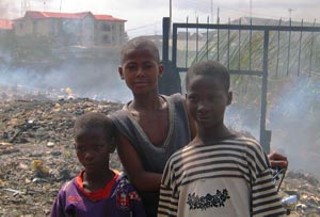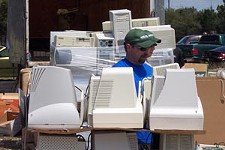Developing World Is Our Toxic Techno Trash Dumpster
Tons of electronic waste are polluting poor countries rather than being recycled
By Daniel Mottola, Fri., Nov. 4, 2005

Photo © Basel Action Netwrok 2005
Each month, hundreds of shipments of electronic waste exported from the U.S. and Europe to developing countries for supposed reuse and repair are actually dumped and often burned in unregulated conditions, releasing an array of toxic contaminants and creating a potential environmental disaster, according to a report released last week by worldwide e-waste watchdog Basel Action Network, in conjunction with Austin's Texas Campaign for the Environment.
In the port city of Lagos, Nigeria, investigators found computers with ID tags from the cities of Houston and San Antonio, among many other sources across the U.S. and Europe. The report and accompanying video, "The Digital Dump: Exporting High-Tech Re-use and Abuse to Africa," alleges that U.S. recyclers sell or donate the equipment to developing countries as a way of skirting costly domestic recycling regulations. In Lagos, while there is a healthy market for repairing and refurbishing old computers, cell phones, televisions, and other electronic equipment, local experts say as much as 75% of the imports – roughly 400,000 computers or monitors each month – are not economically repairable and are being discarded and routinely burned, according to the report. E-waste can contain an array of toxic materials, including lead, mercury, cadmium, barium, beryllium, and brominated flame retardants (similar to PCBs outlawed in the 1970s) – some of which become many times more hazardous when burned. More than 63 million computers in the United States will become obsolete in 2005, according to a New York Times report.
"Things are completely out of control," said BAN investigation coordinator Jim Puckett. "Manufacturers have got to get toxic chemicals out of electronic goods, governments have got to start enforcing international law, and we consumers have got to be a lot more careful about what our local 'recycler' is really doing. It's time we all get serious about what is now a tsunami of toxic techno-trash making its way from rich to poorer countries, and start taking some responsibility."
Following the release of "The Digital Dump," Hugh Miller, with the city of San Antonio Information Technology Department, told San Antonio Current he plans to change the city's salvaging process so that its computer vendor will be responsible for taking back old computers.
Robin Schneider, Director of Texas Campaign for the Environment and national vice-chair of the Computer TakeBack Campaign, spearheaded successful efforts beginning in 2002 to influence local PC manufacturer Dell to institute producer responsibility programs, keeping their computers from being improperly disposed of. Now, both Dell and Hewlett-Packard have begun taking back obsolete products for safe recycling and disposal. TCE estimates that computer manufacturers' failure to take back obsolete products will cost Texas taxpayers $606 million in taxes over 10 years, $41 million in the Austin area alone. The solution, says TCE, are more comprehensive producer take-back initiatives, in which there is a built-in incentive to make electronics that are more recyclable, last longer, and use less toxic material. Advocates are now asking Apple to take back more than the discarded iPods they currently accept.
In 2002, BAN released a similar video and report called "Exporting Harm: The High Tech Trashing of Asia," drawing attention to unsafe labor conditions and environmental contamination in China and other developing nations. Read the full report at www.ban.org. For more information, see www.texasenvironment.org and www.computertakeback.com.
Got something to say on the subject? Send a letter to the editor.









